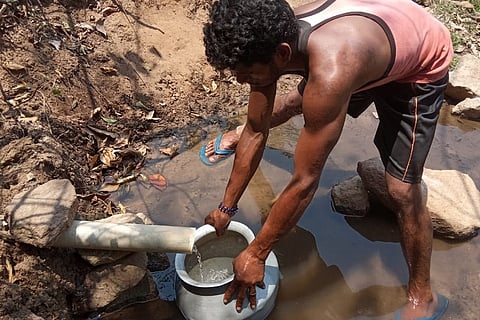

Men and women rising before dawn and rushing to the public handpump to fetch their share of water of the day, is an everyday sight in the tiny hamlet of Kondaparthi. Twenty one-year-old Anjini Vijaya wakes up at 4 am every day to ensure she can finish all her chores before she can reach the MGNREGA worksite by 6 am. “We queue up for hours to fetch water,” Vijaya says, “It takes half-an-hour to fill a 20 litre container. And even that water is contaminated and muddy.”
Located in Lothugadda panchayat of Mentada mandal, in Andhra’s Vizianagaram, Kondaparthi – and other hamlets like Vuyyadavalasa, Jeerikivalasa, Ippalavalasa, Thotavalasa, Erravanivalasa, Basalapadu, and Sarakavalasa – are staring at a massive water crisis. But their pleas for help from authorities concerned have been ignored so far, the residents say.
The hamlets are home to roughly 1,500 people, most of them Adivasis. The hillside hamlets depend on five tanks, that locals say, have a capacity of 10,000 litres each, and 10 handpumps, for their water needs. But the tanks have dried up thanks to the scorching heat, and the hand pumps are mostly producing air because of groundwater depletion.
“We have been asking officials to fix the defunct bores, or provide us with alternative water facilities, but to no avail,” Vijaya says.
“The local leaders tried to fix the hand pumps,” says Vijaya’s husband, 30-year-old Appala Raju, “but they keep going back to the same condition, and even the leaders are exhausted. The government needs to find alternate solutions.”
Few people, but fewer water resources
A lot of residents in these hamlets depend on MGNREGA work for their livelihood. The government has declared that, due to rising temperatures, MGNREGA work has to be done between 6 am and 12 noon, before it gets too hot. And that means the early morning rush for water is chaotic.
“Everyone wants to go to work on time, and there are issues if someone takes more water,” Vijaya says.
“When the water from the handpumps is muddy, we try to go to a nearby hamlet to see if they have clean water,” says Appala Raju, “but all the hamlets here are facing the same problems.”
Thirty-year-old Jarra Simhadri lives in Vuyyadavalasa, a hamlet that has just 150 residents. But even this tiny community is struggling to get enough water for their needs – they have just one hand pump. “In our neighbouring Jeerikivalasa, there are just 10-15 families. They are relying on a water spring near the hill slope – now even that is going to dry up,” Simhadri says.
Officials deny ‘crisis like situation’
Residents in these hamlets say that government officials need to find spots where water is available and dig bores, or provide water through tankers. “If not, the survival of our livestock is going to be tough,” Simhadri says.
Pragna Anand B, a child education activist working with an NGO Global Aid based in Mentada says, “Government officials can provide water through alternative means. They can bring water through tractors and tankers.”
“Due to the contaminated water, people in the area are falling ill,” says Sai Padma, president of Global Aid.
However, officials say that while there is a water problem in the area, it is not a ‘crisis like situation’ yet. Sathya Kumar PE, Assistant Executive Engineer of Mentada mandal says, “We have launched a programme to fix handpumps and motors recently. We are supplying water from private sources in hamlets that have no water at all.”
Vizianagaram District Rural Water Supply (RWS) Superintending Engineer (SE) Gayatri Devi says, “There are enough handpumps and water supply schemes. It is possible that the groundwater level has fallen due to the summer heat.”
RWS officials believe that Lothugadda area could have seen as many as two meter depletion in groundwater.
"We have sought reports from officials concerned and are directing them to sort out issues in any village in the district,” she adds.